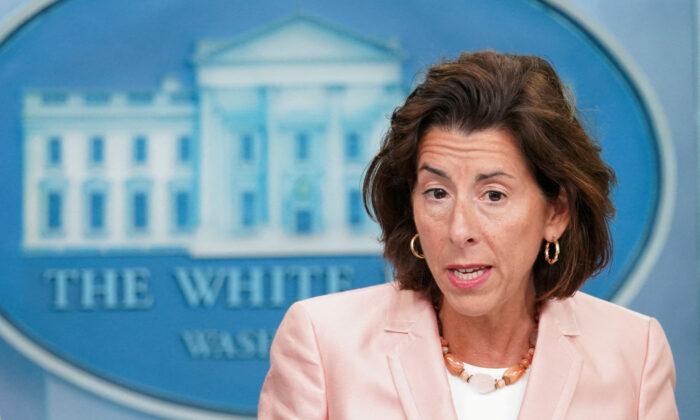The United States is taking “urgent” actions to protect Americans’ data amid growing concerns over security risks posed by TikTok and other foreign companies, a U.S. official said.
Commerce Secretary Gina Raimondo told Reuters that the government is hiring people to monitor and identify companies that may pose “undue security risks” to the country’s networks or data.
At the Senate hearing on Wednesday, Raimondo said they planned to form a team to do “monitoring, investigation, and enforcement” while safeguarding communications and technology networks.
“I think it is a top priority, and we need to move with urgency,” she said.
“It’s more than one company, and it is a constant, pervasive threat, and we need the permanent tools properly funded with expertise,” Raimondo added.
Raimondo said her department was actively assessing the risks posed by Chinese companies, and that additional resources may be necessary to review export control issues.
“I’ve put over 200 Chinese companies on the entity list in my tenure and we are actively, constantly investigating additional threats, and if we think companies need to go onto the list, I will not hesitate,” she said.
The White House and Raimondo support the Restrict Act. Critics say the bill is overbroad and hurts civil liberties of Americans including the more than 150 million U.S. TikTok users. The Chinese video-sharing app denies it improperly uses U.S. data.
They urged the Committee on Foreign Investment in the United States (CFIUS), which is chaired by Yellen, to impose structural restrictions on TikTok’s American operations.
This came after ByteDance, TikTok’s Chinese parent company, admitted that its employees used the social media app to track journalists, including two American journalists.
“The risks associated with TikTok are not limited to sensitive account data and information collected through advertising trackers, but include the app’s access to hours of personal videos and discussions of tens of millions of Americans, and its control over the platform’s powerful algorithmic recommendation system,” they stated.
‘Brainwashing App’
TikTok has more than 100 million users in America, with many earning an income from the app. Some lawmakers and security experts have described the app as “a spy balloon into your phone.”In line with actions taken by global leaders, the White House on Feb. 20 ordered TikTok purged from all government devices and systems to keep U.S. data safe.
The company, like many organizations in China, is bound by the regime’s National Intelligence Law, which requires all organizations and citizens to “support, assist, and cooperate with national intelligence efforts.”
Arthur Herman, a senior fellow at the U.S. think tank the Hudson Institute, previously told The Epoch Times that the app harvests an enormous amount of data that can be used to picture, in the case of the United States, “where American vulnerabilities lie.”
Its algorithms can also turn the app into a “brainwashing app” by filtering content disliked by the CCP, Herman said.






Friends Read Free